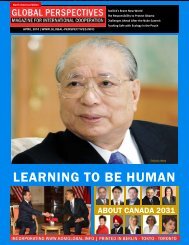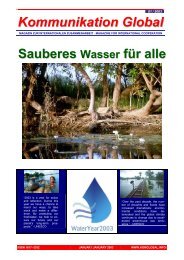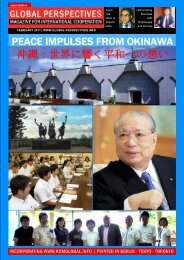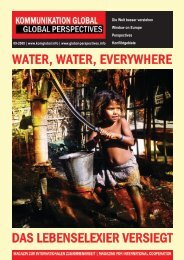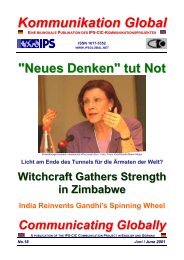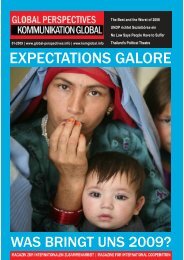GLOBAL PERSPECTIVES | Second Quarterly 2013 â North America ...
GLOBAL PERSPECTIVES | Second Quarterly 2013 â North America ...
GLOBAL PERSPECTIVES | Second Quarterly 2013 â North America ...
You also want an ePaper? Increase the reach of your titles
YUMPU automatically turns print PDFs into web optimized ePapers that Google loves.
<strong>GLOBAL</strong> <strong>PERSPECTIVES</strong> - SECOND QUARTERLY <strong>2013</strong><br />
would have been made than is talked about now. Some<br />
progress has in fact been made, however, and anybody<br />
committed to a “half full” and not a “half empty” approach<br />
would note this, with some degree of satisfaction.<br />
Cuba, whose economic difficulties following changes in the<br />
former Soviet Union received much adverse comment, is<br />
one of 16 countries that have fulfilled an important task<br />
relating to what can accurately be described as the “food<br />
security MDG”: halving hunger.<br />
The importance of meeting this goal has been emphasized<br />
by the targets attached to it. These are:<br />
Target No. 1 – Halve, between 1990 and 2015, the proportion<br />
of people whose income is less than one dollar a day.<br />
Target No. 2 – Achieve full and productive employment<br />
and decent work for all, including women and young people.<br />
Target No. 3 – Halve between 1990 and 2015, the proportion<br />
of people who suffer from hunger<br />
The other 15 who have met the “halve hunger” goal are<br />
Armenia, Azerbaijan, Chile, Fiji, Georgia, Ghana, Guyana,<br />
Nicaragua, Peru, Samoa, Sao Tome and Principe, Thailand,<br />
Uruguay, Venezuela and Vietnam. Their achievements will<br />
be acknowledged and they will each receive a Certificate of<br />
Recognition at the FAO Conference.<br />
Representatives of all these countries will no doubt be<br />
elated, as well they should be. Although he is in poor health<br />
and does not call the shots in his nation, for Cuba’s Fidel<br />
Castro there will no doubt be special joy in this development.<br />
During his years of authority, Castro was perennially interested<br />
in food security issues both at home and abroad.<br />
Castro will be pleased at his country’s achievement not<br />
only because of this but also because his words of wisdom<br />
uttered close to two decades ago will be formally adopted<br />
as policy by FAO at its June conference. In deference to<br />
Castro’s interest in food security issues, his contribution to<br />
Cuba fulfilling a key task of the “food security MDG”, and<br />
his prescience, FAO’s Director-General Graziano de Silva<br />
sent him a “heads up” on this in a personal letter of commendation<br />
in April.<br />
Views Vindicated<br />
So, consider this: At the time of the FAO World Food Summit<br />
of 1996, Castro urged that total eradication of hunger,<br />
and not a halfway approach, was imperative. He was, some<br />
observers said at the time, outraged that the food summit<br />
was satisfied with adopting a tepid approach to ending<br />
hunger. In his letter of congratulations to Castro and the<br />
Cuban people Graziano reminds him of this: “They say that<br />
in the press conference that followed the summit you said<br />
that even if the target (halving hunger) were achieved we<br />
would not know what to say to the other half of humanity if<br />
it would not be freed from the scourge of hunger. “<br />
With Castro’s foresight on the record, Graziano writes,<br />
sharing a point of triumph with Castro and offering him the<br />
ultimate vindication: “I have the great pleasure to inform<br />
you that the decision of its members and for the first time<br />
in its history, the FAO Conference to be held next June in<br />
Rome, take the total eradication of hunger as the number<br />
one goal of our organisation.”<br />
The proposed approach is similar to what Ismail Serageldin,<br />
currently the Director of Egypt’s showpiece Bibliotheca<br />
Alexandrina, articulated as chairman of the Consultative<br />
Group on Agricultural Research (CGIAR).<br />
Pointing out that slavery was abolished under the leadership<br />
of abolitionists, he urged that a group of New Abolitionists<br />
was required to combine their efforts on ending all<br />
hunger. Nobody will quarrel with the goal of eradicating<br />
global hunger, but what is the appropriate path towards<br />
that goal?<br />
Broad Impact<br />
Agriculture, primarily recognized as a source of food, is<br />
also an important aspect of development, overall. The agricultural<br />
dollar spreads across the countryside creating<br />
wealth as it moves. This, of course, has an impact on income,<br />
health and nutrition, education, the environment,<br />
and empowerment.<br />
Re-emphasising agriculture so that it helps to meet the<br />
goal of universal food security while also serving as a catalyst<br />
of development involves a range of issues including<br />
productivity, crop diversity, natural resources management,<br />
biodiversity protection, capacity building, institution<br />
strengthening, national laws and policies, and international<br />
trade. Effective agricultural research, to strengthen and<br />
expand agricultural knowledge, the basis of new technologies,<br />
is essential. Supporting agricultural research, it has<br />
been said is like putting money in the hands of the poor.<br />
The tasks of agricultural research are more complex than<br />
at the time of the green revolution. Agricultural knowledge<br />
has grown and so has knowledge about agriculture. The<br />
ecological imprint of agriculture is so great that the late<br />
Nobel laureate Norman Borlaug called for a “blue revolution”<br />
that will combine “water-use productivity” with<br />
“land-use productivity<br />
To achieve these goals, the world needs broad and effective<br />
partnerships – involving farmers, civil society, researchers,<br />
policymakers, and politicians -- committed to reinvigorating<br />
sustainable agriculture. Some South-South partnerships<br />
exist. Brazil’s Agricultural Research Corporation (EM-<br />
BRAPA) is a leader in this field. India’s Department of Agricultural<br />
Research and Education, Ministry of Agriculture<br />
(DARE), as well as several private research foundations,<br />
collaborate with partners in the neighboring region and<br />
also in Africa. China has similar programs, with an emphasis<br />
on collaboration with African partners.<br />
Strong national research organizations in the South could<br />
serve as research hubs, creating networks of collaboration<br />
to create and share knowledge and research-based technologies<br />
for agricultural development. If the need to move<br />
ahead from theory to practice is ignored – if the poor remain<br />
forever condemned to a harvest of words, and no<br />
more – the results over the long term will be human tragedy.<br />
[IDN | June 6, <strong>2013</strong>] <br />
- 5 -




